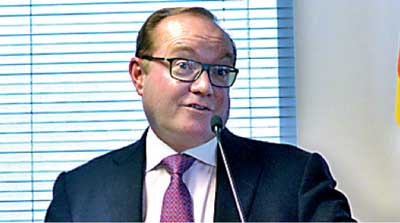Thursday Feb 26, 2026
Thursday Feb 26, 2026
Wednesday, 21 September 2016 00:01 - - {{hitsCtrl.values.hits}}
 By Charumini de Silva
By Charumini de Silva
In order to fully tap into Sri Lanka’s potential to be an International Financial Centre (IFC) the venture must be grounded in the rule of law, credible and pragmatic regulatory systems, market infrastructure and human resources, a top UK financial services expert believes. “Asia and in particular Sri Lanka is in a marvellous position to define a framework that would work best in terms of developing into a global financial centre,” Jones Day Partner John Ahern told at a forum titled ‘Colombo as a Financial Centre - Gearing up for Success’, recently organised by the Marketing Committee of the Colombo Stock Brokers Association (CSBA).
He asserted that if the structure was correct, there was every opportunity to inculcate and encourage significant direct investments in Sri Lanka.
Although there is presently a lack of market infrastructure experience which needs to be addressed, he said the country was well on its way to becoming an offshore financial centre.
However, it was highlighted that there was an obvious need for derivatives and a clearing house going forward to introduce new products as well as carry out smooth transactions.
Noting that the rule of law was the ultimate key to any sustainable financial centre, he said this element was crucial to attract players and participants as well as to be competitive.
He insisted that the regulation of the Colombo International Financial Centre (CIFC) must involve a proper discussion and interaction between the regulator and the regulation process, adding that if not it could become bulky and quickly outdated.
“The worst thing in the world that could happen at a financial centre is to have a degree of inconsistency in the application of regulation. Hence, I think in order to be successful in this regard the regulatory framework needs to be pragmatic, credible and ruthlessly fair,” he stressed.
Looking at Europe and the US there is a fantastic opportunity for Sri Lanka to learn from their mistakes and take advantage of expertise that might be available in other jurisdictions and to learn from their experts, he revealed.
“I think the Central Bank could play a very important role in loosening its control on currency and ensuring that the cash flows can work in an international context,” he suggested.
Ahern stated that there was much concern with political influence largely derived from the involvement of the Chinese and sensitivity to the position in India whether it was clever or desirable that Colombo will proceed with basically a Chinese partner given the importance of the relationship with India. “I have to say, the only country I could remember which really stood by Sri Lanka at the time it really needed it was probably China.”
He added that China would continue to be one of the fastest growing economies in the world. “It is quintessentially going to be one of the most important economies in the world, partly because it is well driven and well organised. China will continue to be a very important and influential financial partner in the world at large.”
He also hailed the decision taken by the new Government to continue with the Colombo Port City noting it was “sensible”.
The Government hopes the proposed project will create 15,000 job opportunities by 2020.